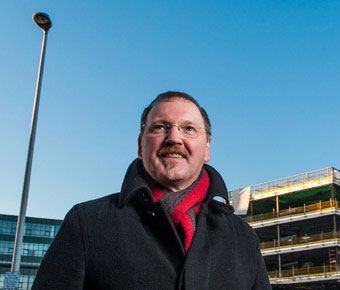
02 Aug 2017
Here’s a topic that is not easy to address. Take a wander around any major city and you will no doubt be aware that begging and rough sleeping is not a small problem.
It’s a highly sensitive issue for many of the Chamber’s members caught between concerns about the impact on their business and their natural human reaction to fellow citizens struggling to cope.
So it was helpful to hear the feedback from research work carried out by the City Council’s arms-length agency Community Safety Glasgow (CSG) into the nature and scale of the issue. It’s hard to explore without stirring up strongly emotive reactions and the research itself generated some controversy as it was being carried out.
CSG’s report confirmed what we had been hearing from many Chamber members who operate businesses in the city centre. Just over 1 in 3 of those businesses asked believe that begging has a serious impact on their business, mainly through the daily impressions of their customers.
The survey of customers backed up their concern, with a similar proportion feeling affected significantly by the presence of begging. So around a third of both businesses and the public have a strongly negative reaction.
But there are some messages from the report which might challenge some common perceptions.
Firstly, begging is not a sure sign of increased homelessness. Almost all begging is done out of desperation, but there are a whole host of issues that bring some of our most vulnerable citizens on to the street. Homelessness is only one alongside welfare benefit changes, dependency on alcohol or drugs, family breakdown, ill health and many other personal disasters.
Secondly, the persistence of begging is not down to a lack of support from the authorities. Glasgow has a City Centre Response Team that helps co-ordinate the work of both voluntary agencies and formal authorities in offering daily support. There’s a small booklet called ‘Eat, Sleep, Meet’ that explains everything that is available.
The Glasgow public is generous however; one in five give money and one in ten give food. So support from the authorities is not always accepted.
Thirdly, foreign citizens do not make up the majority of those begging. The report makes clear that the vast majority of begging is done by locals; only 1 in 4 are from other parts of the European Union. The problem is essentially home grown, not imported.
Finally, begging cannot be stopped by the police. It is not illegal to beg – unless it involves aggressive behaviour – nor is it against the law to sleep rough in a shop doorway.
The majority of people want the solution to begging to be a constructive one; over 55% of the public want beggars to get more help in tackling their problems. Only a third of both the public and the businesses surveyed want a law against begging which could then be enforced.
So the challenge for the authorities is to overcome the reluctance of many on the streets to accept help partly because the public are so generous in offering money. The question is how well do the public know about the services that are daily offered, and are there better ways for the public to help than dropping change into that plastic cup.
Personally I choose instead to buy the Big Issue.